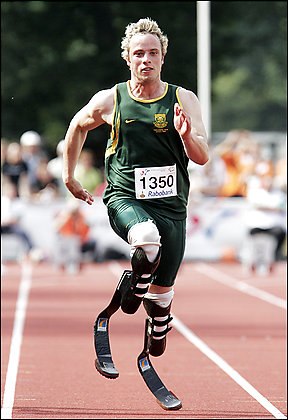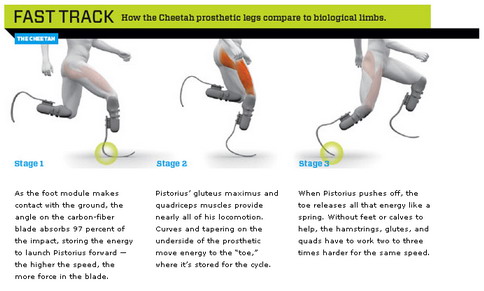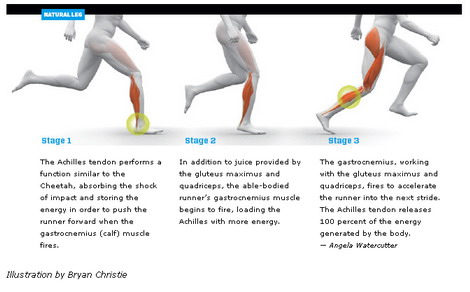Task 1. Read the article and vote in the opinion poll whether to allow Oscar Pistorius to run in the 2008 Olympics or not.

Friday Poll
Should Amputee Oscar Pistorius Be Allowed To Sprint In The Olympics?
Can a Disability Give You Too Much Ability?
South African Oscar Pistorius can run faster than just about anyone on earth which is pretty amazing considering that he doesn't have legs. Due to a congenital condition, the 20-year-old from Pretoria was born without any fibulae. Before his first birthday, his parents were faced with two choices: he could either spend the rest of his life in a wheel chair, or have both legs amputated from the knee down. They chose the latter, outfitting their son with prosthetic legs that allowed him to walk like anyone else, and it turns, to run even faster.
Since Athens, Pistorius has been running in Paralympic events, but also against able-bodied runners. Now Oscar Pistorius is training for the 2008 Olympics. Not the 2008 Special Olympics or a Paralymics, but the able-bodied 2008 Games in Beijing. Having already shattered the 100 and 200 meter world records for disabled athletes, Pistorius is looking to change his nickname from the "fastest thing on no legs" to "fastest man on earth." And with his specially designed "Cheetah Flex Foot" prosthetics, there's a chance he might.
The high tech blades, attached just under his knees, are lighter and longer than average human lower legs and to date have carried him 100 meters in under 11 seconds. But some people argue this gives Pistorius an unfair advantage, including officials at the International Association of Athletics Federations (IAAF), who have "proposed a new rule that would outlaw them." Pistorius and his coach deny any advantage stating that because of his prosthesis, he needs more energy to start running than others, and is far more susceptible to slipping.
Pistorius is forcing the sports world to rethink what it means to be a disabled athlete. Is he so close to world-class that his limitations, his prosthetic legs, represent a disadvantage? Or are the Cheetahs an advantage, an artificial enhancement that makes him faster than he would be if he had natural legs? After all, improvements in human performance are normally limited by biology and evolution. Not in Pistorius’ case. His legs are constantly upgraded by a pit crew of Icelandic gearheads at one of the world’s most sophisticated prosthetic manufacturing facilities.
No one expects able-bodied runners to compete head-to-head with wheelchair-bound marathoners. The wheels confer an obvious speed advantage, and maybe Oscar Pistorius’ Cheetahs do, too. So the real question is this: Do able-bodied athletes need protection from him?
Now's your chance to weigh in: Are Oscar Pistorius's prosthetic legs too much of an advantage or does this amazing athlete deserve a shot at Olympic gold?
Should Oscar Pistorius be allowed to run in the 2008 Olympics? YES/NO
Task 2. Read these two articles for more background and try to understand the ongoing legal debate. Then split up into groups of lawyers and Court representatives. The lawyers should think of as many strategies (not just arguments) as possible to defend their client, so that in case one strategy should fail, they can resort to another. Strategies may include anything from legal, scientific or moral argumentation to emotional blackmail to bribery – except for threatening with the Mafia.
At the same time, the representatives of the Court of Arbitration for Sport (CAS) should prepare their strategies to fend off this and any future attacks from the Pistorius legal team.


Disabled sprinter Pistorius appeals Olympic ban
February 15, 2008
PARIS (AFP) - South African 'Bladerunner' Oscar Pistorius has taken his fight to have an Olympic ban overturned to the international Court of Arbitration for Sport (CAS).
The disabled sprinter, who had both his legs amputated below the knee as a child and runs with carbon fibre blade attachments, wants to be allowed to compete in the 400m in normal Olympics as well as the Paralympics.
But the International Association of Athletics Federations (IAAF) took the decision to prevent Pistorius from competing in the Beijing Olympics after a scientific study revealed that he used 25 percent less energy than able-bodied runners to run at the same speed.
The 21-year-old spent two days in Cologne, Germany, last November undergoing tests alongside five able-bodied athletes of similar ability but he rejected the findings, claiming the tests were flawed.
Now Pistorius has appealed to CAS, and the Lausanne-based body will likely deliver its verdict within four months.
Were he to receive a favourable outcome from CAS, Pistorius would still have to improve on his personal best of 46.46 sec to achieve the Olympic minimum qualifying standard of 45.95 sec, or 45.55 should another South African beat that mark.
Oscar Pistorius announces own research: he has no advantage
March 07, 2008
Oscar Pistorius yesterday announced that he has conducted his own studies in Texas. While these were claimed to have contradicted many of the results from the IAAF testing performed in Cologne, Germany, last year, it is strange that Pistorius questioned the completeness and validity of the research in the first place, since they had opportunities to ensure its validity before and while it was conducted. (They had input and opportunity to help design the studies, and were of course on-hand when the testing was done, to ensure that it was being done fairly.)
Not a single IAAF official was present during these Texas tests, the IAAF was not consulted in any way, and had no opportunity to view the testing while it took place. Understandibly, the IAAF have dismissed the test result.
It would be useful to see a critical analysis of the Pistorius testing, but unfortunately, that is not possible, since Pistorius and his lawyer have refused to say who did the testing, what it consisted of, and what it showed.
Time will tell how this all transpires, and what the truth is.

Ajánlott bejegyzések:
A bejegyzés trackback címe:
Kommentek:
A hozzászólások a vonatkozó jogszabályok értelmében felhasználói tartalomnak minősülnek, értük a szolgáltatás technikai üzemeltetője semmilyen felelősséget nem vállal, azokat nem ellenőrzi. Kifogás esetén forduljon a blog szerkesztőjéhez. Részletek a Felhasználási feltételekben és az adatvédelmi tájékoztatóban.